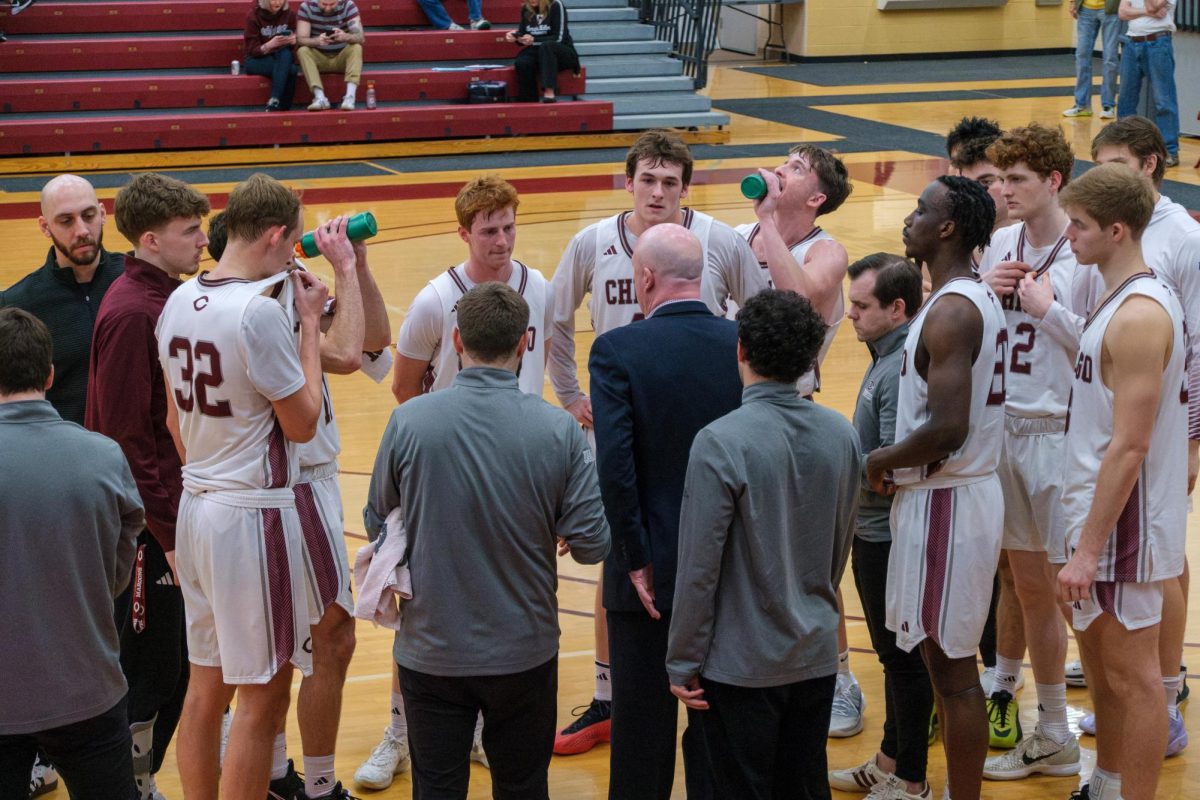Was there any doubt that there would be an epic collision when two nationally-ranked rivals met each other in their first taste of conference play this season?
The fourth-ranked and 16th ranked teams in the nation, Emory and Chicago respectively, squared off Saturday in the first match of the UAA round robin. To add to the buildup, Emory had eliminated Chicago from the UAA Championships last year en route to winning the tourney and both figure to play significant roles in this year’s postseason.
The Maroons stumbled out of the gates as Emory took the first game in the best-of-five match. But the Chicago side rebounded in stunning fashion by winning the next two games to put the defending UAA champion Eagles on the brink.
“In the second and third sets we were on fire,” second-year Nikki DelZenero stated. “Our defense and consistency on offense forced them to make errors.”
The momentous victory for Chicago was not to be as Emory rattled off a few volleys themselves. The next set was tightly contested until Emory rallied midway to put the game out of reach and tie up the match. The Eagles then finished off the depleted Maroons in a dominating fifth game and continued a 17-game win streak with the 25–21, 20–25, 18–25, 25–16, 15–8 victory.
“In the fourth set, the score was tight until about 12 or 13 and we just couldn’t finish strong,” said DelZenero. “I think that’s what caused us to not show up in the fifth until it was too late.”
“Our game against Emory displayed, at times, the high quality of play of which our team is capable,” fourth-year Colleen Belak said. “Of course we are sorely disappointed with our loss. We did not put three games together well enough to pull out a win against Emory and that is very frustrating for a team with our potential.”
The quality from both sides was undeniable as both squads had to summon their maximum effort to overcome deficits at one point or another in the match. Second-year Morgan Clark and fourth-year Isis Smalls led the Maroons’s offense with 11 kills each, while third-year Caroline Brander led the defense with 3.5 blocks and Chicago totaled a monster 86 defensive digs. Emory’s numbers were even more thunderous with 74 total kills and 95 defensive digs.
However, the importance of these outsized statistics lay in where they were accumulated in the course of the match. The Eagles held the advantage in that aspect, garnering the win in the process.
“The match was decided by a few runs and changes of momentum,” Clark said. “As we work to progress more as a team and polish up a few things, we will gain more control over those situations and peak as a team at the right time going into postseason.”
With their second loss of the season coming against yet another nationally-ranked opponent, the Maroons will have to answer questions of their ability to close against elite teams. Their earlier loss against Carthage was eerily similar to this one, as Chicago had an early 2–1 lead in games before succumbing to the higher-ranked opponent. But the Maroons were quick to point out that this match required more effort from their opponent and showcased a more complete technical proficiency from the Chicago side.
“We took the lesson that we learned against Carthage and applied it to this match and we will now learn from the Emory match to improve for our next one,” head coach Vanessa Walby affirmed of the Maroons’ development.
“This was not the same team that played against Carthage,” DelZenero stated. “I have no doubt in my mind we can hang with the elite teams. We’re close to beating these teams and we’re going to put it together.”
Both teams admitted after the match to considerable fatigue, both mental and physical. “We knew it was going to be a battle with this team and I honestly had a feeling before the match that it was going to go five games,” Walby said. “It was difficult for us to bounce back after our Emory match and Emory’s [coach] actually said it took her team a little bit [of strain] as well.”
In the next match, their depletion was evident in the way Case Western Reserve jumped out to an early 2–1 lead before Clark and Smalls took control, giving Chicago the 26–24, 20–25, 24–26, 25–22, 15–11 win. The Maroons’s offensive duo collected 14 and 15 kills respectively as Chicago recorded a season-high 60 kills and 103 defensive digs.
Besides the exhaustion, the Maroons also had to contend with a great defensive team in Case.
“The Case match was a great test to our team and mainly to our offensive system,” Clark said. “We really had to rely on our offense to step up and terminate the ball in order to avoid long rallies, [producing] the high kill count.”
“We did not play our best during this game and that is reflected in the game distribution and score,” Belak said. “We were happy to pull off the win, but in no way satisfied with our play.”
The Maroons used the motivation to dominate their last opponent, Rochester, in a straight-set 25–19, 25–19, 25–13 victory on Sunday. Five players contributed more than five kills and Chicago recorded 13.5 total blocks on the day.
“Our Rochester game was better because despite lulls we played fairly solidly for three entire games and worked together cohesively as a team,” Belak said.
“We did not have a different mindset going into [this] game than we did going up against Emory and Case,” Clark explained of the Maroons’s outlook. “We treat every team the same and lay out specific skills as a team that we need to perfect [in] every match in order to win.”
The Maroons will be away at Concordia on Wednesday.








